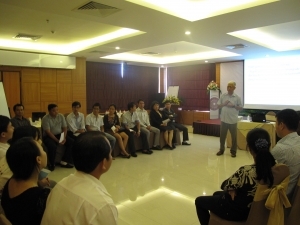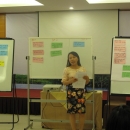Project learning: how to do it better
SGF training workshop in Viet Nam
Location: Ha Noi, Viet Nam. 16th Dec 2014
One of the things we’ve learned is that the reports the grantees send us miss a lot of important stuff and typically underestimate the project’s impacts. This makes it harder for us to capture results and lessons learned to report to our donors. So poor quality reporting is a problem both for our grantees and for us.
To help fill this gap, IUCN organized a 3-day workshop on project evaluation and reporting in HCMC in early December. In the past, we’ve provided grantees with training on many aspects of project cycle management but never on evaluation and reporting. The workshop was attended by 24 people from 13 projects that will end by the end of 2014 or early 2015. The trainer was Dr. Le Dai Tri, a consultant with long experience evaluating public health projects.
During the workshop, participants were introduced to the key reporting concepts and shown how to properly use the quantitative and qualitative evaluation tools in the MFF Guidelines. The trainer reviewed and corrected several project log frames and draft reports. The participants responded positively. Ms. Phan Thi Thanh Truc of Tra Vinh University said that she had “learned how to design and choose appropriate language for questionnaires and ways to ensure the active participation of local communities in focus group discussions”. Mrs. Tran Thi Thu Nga of FACOD, a local NGO, said “thanks to the teacher, we are equipped with what was lacking and we truly needed”.
The trainer used games, songs, and other team-building exercises to maintain interest. “The teacher has a very attractive teaching method. Though I have attended many similar training events, I was very impressed with his active teaching style. He took people away from their laptops to fully concentrate on the training”, said Mr. Hoang Luong from the Hai Phong Red Cross.
Participants also drafted stories of the on-the-ground changes that they had seen. These stories are powerful communication tools that articulate the project’s impacts in ways non-specialists can understand. After the training, participants were asked to submit their stories to IUCN. After review, these will be posted online.
IUCN also benefited from the training. “After the course, I realized that the MFF Secretariat and National Coordinating Body members [who supervise MFF activities in Vietnam] made mistakes during the M&E site visits”, said IUCN’s Ms. Nguyen Bich Hien. Perhaps the most important result for IUCN is that we should have organized these training courses earlier in the project cycle. So it was a valuable learning exercise for all of us.

